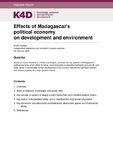| dc.description.abstract | Since Madagascar’s independence in 1960, socio-political crises and their aftermaths have regularly wiped out, and even set back, the country’s macroeconomic growth and human development (Razafindrakoto, Roubaud, et al., 2017a, p. 9). GDP per capita has consequently kept decreasing since 1960, with political crises in 1972, 1991, 2001-2002, and 2009-2013. The 2009 crisis and its repercussions were thus only the latest in a longer-term pattern of economic contractions, followed by rare moments of economic revival, which in turn are brought down by popular protests (Razafindrakoto, Roubaud, et al., 2017a, pp. 9–11). This review synthesises evidence on the key aspects of Madagascar’s political economy which affect inclusive, environmentally sustainable livelihoods and growth, and basic issues in sustainable human development in the country. Within a vast amount of literature available on Madagascar, there is a large body of empirical knowledge that addresses political economy in the country, and its role in shaping Malagasy development and environment (some of this knowledge explicitly refers to ‘political economy’, while most of it uses other terminology to examine such questions). As agreed with DFID, the present section details and assesses what research, knowledge, and data are available. The causes of Madagascar’s trajectory lie in a system of deeply rooted hierarchies and unstable political orders, which has four key aspects and elaborated in the third section. The key actors of Madagascar’s political economy are its individualised elites, and its mobilised by fragmented population as explained in the fourth section. The fifth section focuses on the key dynamics of Malagasy political economy, marked by socioeconomic contradictions, democratic space, and institutional decay. | en |

